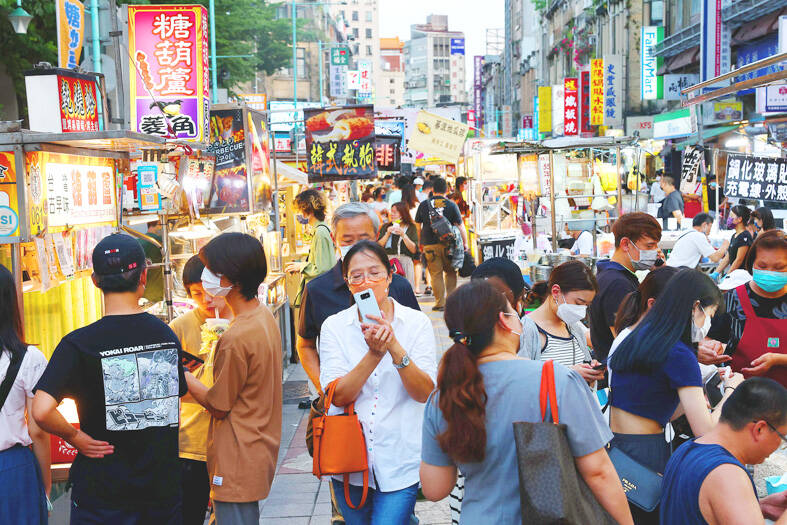Nearly 40 percent of potential tourists surveyed said they are interested in visiting Taiwan this year, with food cited as the biggest draw, a poll released on Monday by a travel-related news Web site showed.
The findings were part of a report that the Chinese-language Xinmedia, which is affiliated with Lion Travel Service Co (雄獅旅行社), presented during a global travel forum on trends related to travel to Taiwan this year.
Although the report referred to respondents generally as “international tourists,” most participants were Asian, with 33 percent from South Korea; 22 percent from Japan; 17 percent from China, Hong Kong and Macau; and 12 percent from Southeast Asia.

Photo: CNA
The survey showed that more than 50 percent of the respondents planned to travel to Taiwan within the next two years, while nearly 40 percent hoped to visit this year.
Regarding why they wanted to visit Taiwan, the top three reasons cited by respondents were Taiwan’s specialty foods (60.7 percent), natural scenery (43.9 percent) and safe environment (22.8 percent).
Among those interested in traveling to Taiwan, 38 percent said they would visit through custom tour packages, 35 percent said they would purchase one-day tours in Taiwan through online travel platforms and 27 percent said they would opt for group tours arranged by travel agencies.
Nearly 40 percent of the respondents said they were willing to spend more than US$1,000 on a trip to Taiwan and were willing to spend more for restaurants, accommodation and activities that offer localized experiences.
The survey also found that 50 percent of respondents who wanted to visit Taiwan would stay for three to five days, followed by 23 percent who would stay one to two days and 17 percent who would stay for five to seven days.
The top five tourist destinations cited in the survey were Taipei (74.2 percent) and Kaohsiung (32.8 percent), followed by New Taipei City, Tainan and Hualien County, the survey found.
The most popular travel experience cited was “night market shopping” (43.4 percent), followed by city tours and green tourism, while the most popular food was xiaolongbao, small steamed dumplings.
The choices of the relatively small number of European and American respondents differed significantly from those of Asian tourists.
They said they would prefer to spend seven to 10 days in Taiwan, with Taitung County and outlying islands given as the most popular tourist destinations, Xinmedia said in the report.
The survey was conducted between Jan. 3 and Feb. 9, with 3,011 valid questionnaires collected.

Sweeping policy changes under US Secretary of Health and Human Services Robert F. Kennedy Jr are having a chilling effect on vaccine makers as anti-vaccine rhetoric has turned into concrete changes in inoculation schedules and recommendations, investors and executives said. The administration of US President Donald Trump has in the past year upended vaccine recommendations, with the country last month ending its longstanding guidance that all children receive inoculations against flu, hepatitis A and other diseases. The unprecedented changes have led to diminished vaccine usage, hurt the investment case for some biotechs, and created a drag that would likely dent revenues and

Macronix International Co (旺宏), the world’s biggest NOR flash memory supplier, yesterday said it would spend NT$22 billion (US$699.1 million) on capacity expansion this year to increase its production of mid-to-low-density memory chips as the world’s major memorychip suppliers are phasing out the market. The company said its planned capital expenditures are about 11 times higher than the NT$1.8 billion it spent on new facilities and equipment last year. A majority of this year’s outlay would be allocated to step up capacity of multi-level cell (MLC) NAND flash memory chips, which are used in embedded multimedia cards (eMMC), a managed

CULPRITS: Factors that affected the slip included falling global crude oil prices, wait-and-see consumer attitudes due to US tariffs and a different Lunar New Year holiday schedule Taiwan’s retail sales ended a nine-year growth streak last year, slipping 0.2 percent from a year earlier as uncertainty over US tariff policies affected demand for durable goods, data released on Friday by the Ministry of Economic Affairs showed. Last year’s retail sales totaled NT$4.84 trillion (US$153.27 billion), down about NT$9.5 billion, or 0.2 percent, from 2024. Despite the decline, the figure was still the second-highest annual sales total on record. Ministry statistics department deputy head Chen Yu-fang (陳玉芳) said sales of cars, motorcycles and related products, which accounted for 17.4 percent of total retail rales last year, fell NT$68.1 billion, or

In the wake of strong global demand for AI applications, Taiwan’s export-oriented economy accelerated with the composite index of economic indicators flashing the first “red” light in December for one year, indicating the economy is in booming mode, the National Development Council (NDC) said yesterday. Moreover, the index of leading indicators, which gauges the potential state of the economy over the next six months, also moved higher in December amid growing optimism over the outlook, the NDC said. In December, the index of economic indicators rose one point from a month earlier to 38, at the lower end of the “red” light.